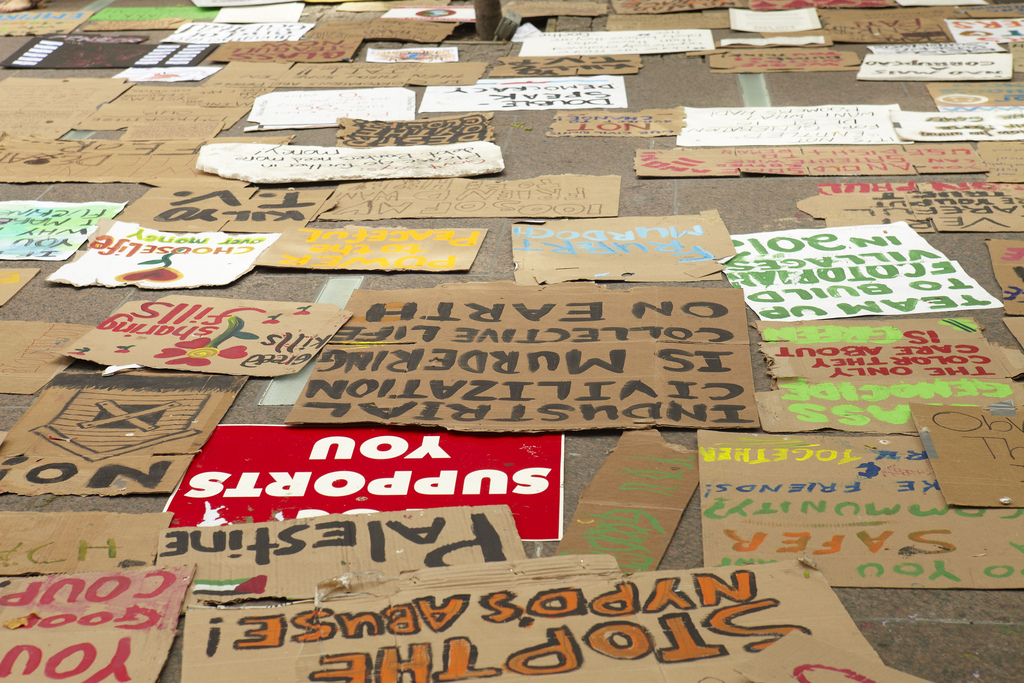Barely one month after a few protesters began camping out on Wall Street, the Occupy movement has grown into a worldwide phenomenon. It is undeniable that the sentiments of the movement have struck a deep chord within this country, which is now experiencing one of the largest and most widespread mobilizations of social and political activism in its history. Whether this is an American reaction to the Arab Awakening, a response to the Tea Party movement, or just several years of pent up economic frustration, the speed with which this movement has captured the nation’s attention is extraordinary. Those who never considered themselves “activists” before are out in the streets marching and voicing their concerns Beyond the tens of thousands who are participating in direct actions, the movement has forced itself into America’s collective consideration and has truly begun to achieve one of its fundamental aims: to start a conversation.
The conversation thus far has spanned a variety of issues, but the central themes have been inequality and the influence of money on politics. Exactly which issues the movement will address is evolving. Each new person who joins in has a unique set of concerns. I view Occupy as seeking to be a space where some of those concerns overlap for everyone. Visually, the picture that comes to my mind is a huge and complex moving Venn diagram, where the mission of the Occupy movement is the piece in the center, yet uncertain of its size and shape.
Social movements do not emerge suddenly fully formed with cohesive, delineated mission statements. Even in past movements that had a specific goal, such as the civil rights movement, there were a variety of opinions and dimensions and at times there was a struggle to keep their messages coherent. Key decisions about the Occupy movement are literally made by everyone during General Assemblies, in a consensus process that forces debate and permits everyone to have their voice heard. Even though we are all familiar with the democratic process, it is a very different experience to work inside of it, in a direct democracy.

Upon examining what this movement has meant to me and why I have devoted my time to this cause, I realized that underlying my agreement with the issues that Occupy is fighting for is my belief in the power of social movements and democratic participation. There are two clichés that come to mind in this case: “democracy is not a spectator sport” and “government comes from the consent of the governed.” Like many other clichés, these statements have been repeated over and over because they hold such an important pearl of wisdom.
The thin definition of democracy is a system of government by the whole population. If “we the people” are really the ones who are governing this country, should our participation be limited to checking off some boxes on a form once a year? I believe that peaceful protest is extraordinarily and exceptionally democratic because it is a way for people to have their voices heard by those who most directly influence policy. If as citizens we do not consent to the policies or behavior of our government, it is our duty to speak up and contribute constructively to dialogue on solutions.
I do not know where the Occupy movement is going and no one else does either. I do know that important conversations have been started and are emerging on issues of inequality, money in politics, unemployment, and how the financial system functions. The discussions about the protests themselves are also a valuable discourse about the practical limits of free speech, civil disobedience, and who the police are most interested in protecting and serving. While some may treat us with a condescending or reductionist attitude, the Occupy movement is the biggest thing to come along in my lifetime to transcend left-right politics and petty political gamesmanship.
Occupy Wall Street has catalyzed political engagement among a generation widely perceived to be apathetic and a bit jaded about the American political system. Their participation in our democratic process as citizens concerned about who retains the power in this country, who is benefiting from the current system, and the viability of the American Dream, can only bring about good things for the future of this country and the strength of our democracy.


